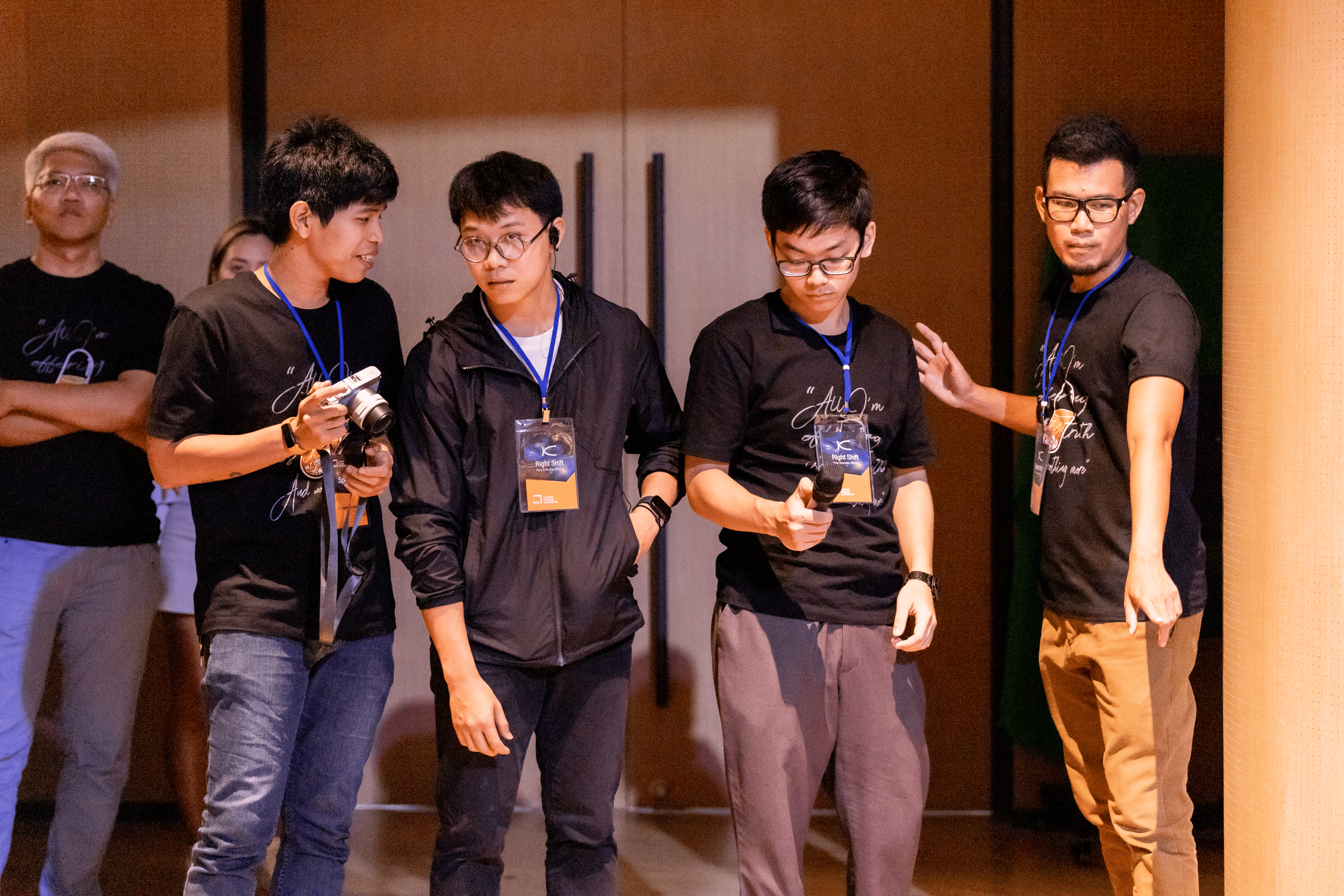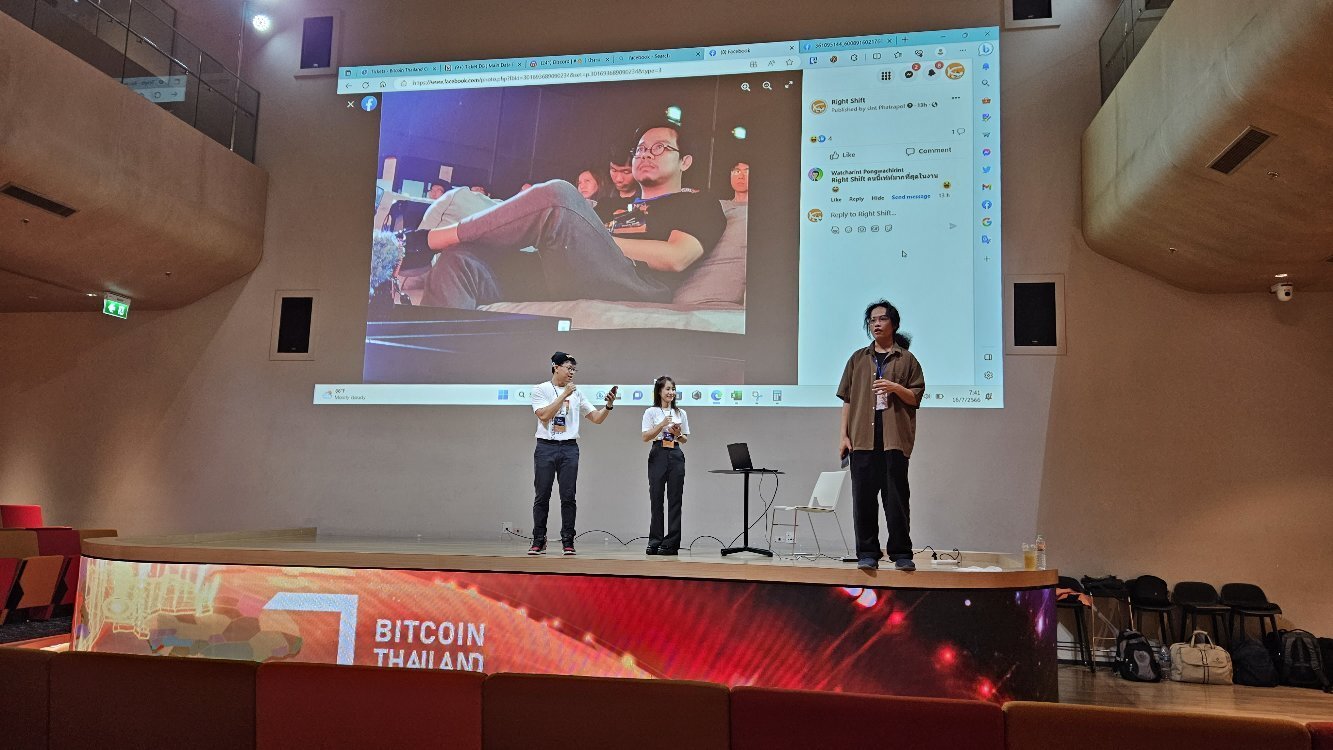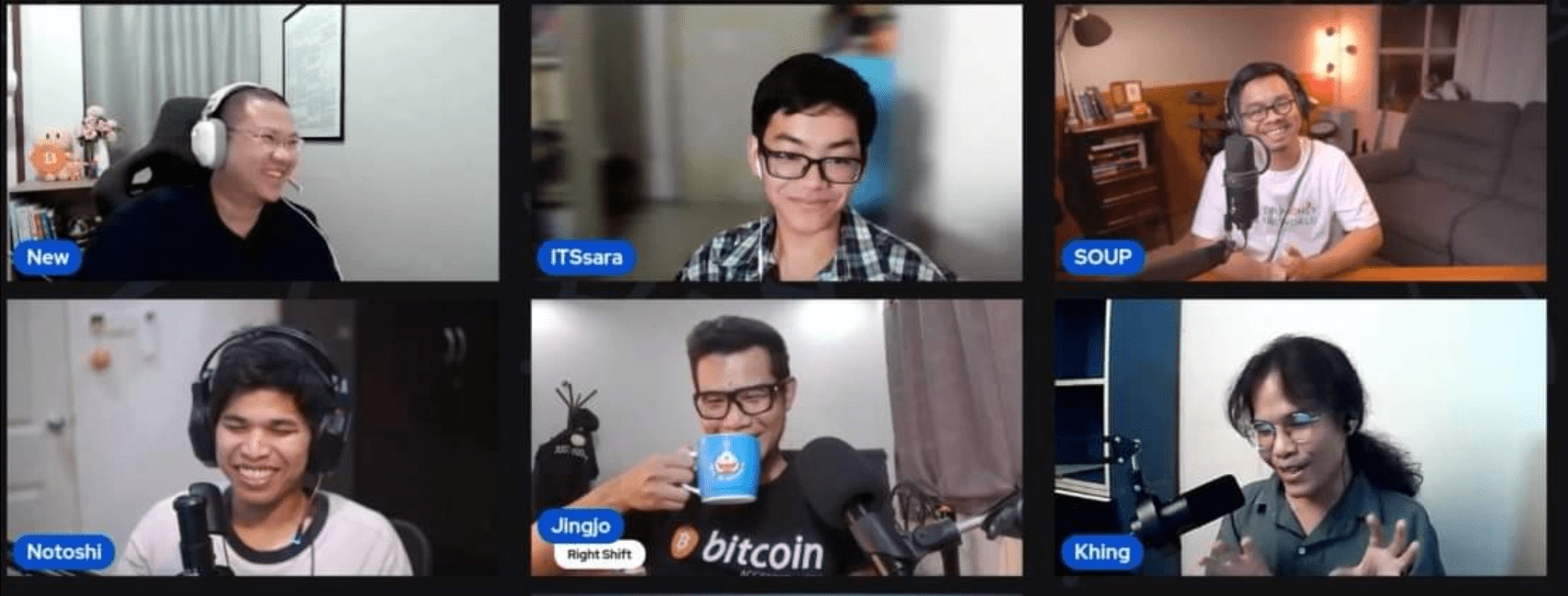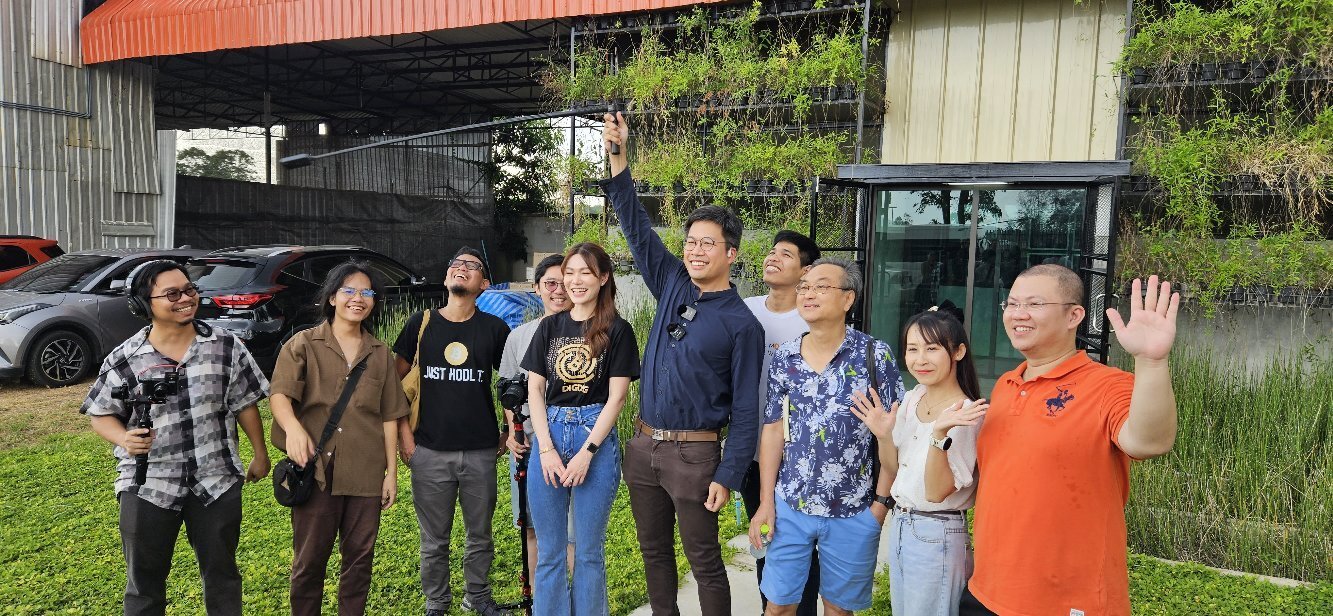"Six months from now, we'll have our own YouTube channel…"
This sentence left me stunned for a moment. It was December 18, 2025, and we were at B.O.B Spaces, the first place where the pioneering members of Right Shift had gathered in person.
Two couples (<span itemprop="mentions" itemscope itemtype="https://schema.org/Person"><a itemprop="url" href="/npub1prya33fnqerq0fljwjtp77ehtu7jlsjt5ydhwveuwmqdsdm6k8esk42xcv" class="bg-lavender dark:prose:text-neutral-50 dark:text-neutral-50 dark:bg-garnet px-1"><span>Tum ⚡🟧</span> (<span class="italic">npub1pry…2xcv</span>)</a></span> & <span itemprop="mentions" itemscope itemtype="https://schema.org/Person"><a itemprop="url" href="/npub1e963pmyq9q6873njkzxu279l8rh3mymxj9y5lq3x3hkeyj5s2pkqut3z4f" class="bg-lavender dark:prose:text-neutral-50 dark:text-neutral-50 dark:bg-garnet px-1"><span>Bow RightShift</span> (<span class="italic">npub1e96…3z4f</span>)</a></span>) at the table seemed confident that this dream would become a reality. As I looked around, I couldn't help but notice the diverse emotions filling the room.
Arm (<span itemprop="mentions" itemscope itemtype="https://schema.org/Person"><a itemprop="url" href="/npub1qd6zcgzukmydscp3eyauf2dn6xzgfsevsetrls8zrzgs5t0e4fws7re0mj" class="bg-lavender dark:prose:text-neutral-50 dark:text-neutral-50 dark:bg-garnet px-1"><span>Notoshi⚡</span> (<span class="italic">npub1qd6…e0mj</span>)</a></span>) was still lost in his thoughts, Nim (<span itemprop="mentions" itemscope itemtype="https://schema.org/Person"><a itemprop="url" href="/npub1eahsj3ngx39s3dvk78frad0dwsw09q8nqprudy8vld4sjqd8uafsu362ah" class="bg-lavender dark:prose:text-neutral-50 dark:text-neutral-50 dark:bg-garnet px-1"><span>Noonim</span> (<span class="italic">npub1eah…62ah</span>)</a></span>) was searching for courage, Dr. New (<span itemprop="mentions" itemscope itemtype="https://schema.org/Person"><a itemprop="url" href="/npub1wzlj8qxwzwfls9fez23ne90rjey6kxkaqz7nltfajqx5kmp7w2tqfkkad0" class="bg-lavender dark:prose:text-neutral-50 dark:text-neutral-50 dark:bg-garnet px-1"><span>npub1wzlj8qxwzwfls9fez23ne90rjey6kxkaqz7nltfajqx5kmp7w2tqfkkad0</span> (<span class="italic">npub1wzl…kad0</span>)</a></span>) was motivated but directionless, and Sharky (Munich <span itemprop="mentions" itemscope itemtype="https://schema.org/Person"><a itemprop="url" href="/npub1vm0kq43djwdd4psjgdjgn9z6fm836c35dv7eg7x74z3n3ueq83jqhkxp8e" class="bg-lavender dark:prose:text-neutral-50 dark:text-neutral-50 dark:bg-garnet px-1"><span>123🦈ปลาฉลามขึ้นบก</span> (<span class="italic">npub1vm0…xp8e</span>)</a></span>) struggled to even say "yes." ITSsra (<span itemprop="mentions" itemscope itemtype="https://schema.org/Person"><a itemprop="url" href="/npub1z7k4pffj7250eaydd3ya0v07mmzecylcq9cw5af68zu39q0k4u3qj6xre4" class="bg-lavender dark:prose:text-neutral-50 dark:text-neutral-50 dark:bg-garnet px-1"><span>itssara</span> (<span class="italic">npub1z7k…xre4</span>)</a></span>) was just a kid with unknown potential, Khing (<span itemprop="mentions" itemscope itemtype="https://schema.org/Person"><a itemprop="url" href="/npub1a8wreeghu0j8g4zqgzex53sq38gjwjdp5czxnu3rfydnz8n8yu2spqkavy" class="bg-lavender dark:prose:text-neutral-50 dark:text-neutral-50 dark:bg-garnet px-1"><span>Khing_T21</span> (<span class="italic">npub1a8w…kavy</span>)</a></span>) seemed the most promising but had yet to take the first step, and JingJo (<span itemprop="mentions" itemscope itemtype="https://schema.org/Person"><a itemprop="url" href="/npub15l5mxmljftnnqur8gf2nkjj2yuemqy2kuly7yc29lx7x598svx5s447rgk" class="bg-lavender dark:prose:text-neutral-50 dark:text-neutral-50 dark:bg-garnet px-1"><span>Jingjo</span> (<span class="italic">npub15l5…7rgk</span>)</a></span>) wanted to stick to writing articles for now.
None of us had any experience in doing something like this before.
A soft-spoken man (<span itemprop="mentions" itemscope itemtype="https://schema.org/Person"><a itemprop="url" href="/npub1prya33fnqerq0fljwjtp77ehtu7jlsjt5ydhwveuwmqdsdm6k8esk42xcv" class="bg-lavender dark:prose:text-neutral-50 dark:text-neutral-50 dark:bg-garnet px-1"><span>Tum ⚡🟧</span> (<span class="italic">npub1pry…2xcv</span>)</a></span>) looked into my eyes as if to say, "Well?" I met his gaze and thought, "Alright, let's do this," while contemplating deeply.
Back then, Right Shift was just a name that Mr. Piriya had recently announced to the public. We were entering a market filled with Bitcoin giants, seasoned experts, and countless influencers. How could we possibly stand out?
But I had something that no one else had, and from that point on, no one else could ever have: the privilege of being the first to do it.
A voice in my head told me to overlook the initial hurdles and to go back to square one.
If a newcomer were to enter the market today, interested in learning about Bitcoin, do we have the right resources for them?
Apart from Mr. Piriya, how many people are seriously producing Bitcoin content?
The younger members must be excited to try something new. For some, it might even be a dream come true. They have no idea what challenges lie ahead, and I had been pondering this for quite some time.
For me, it wasn't just about starting; it was about sustainability, personal development, emotional intelligence, scalability, and the value we could pass on to our audience. It was more than just the minor details that others might see.

Starting is never easy
Even though we set a six-month timeline to figure out how to launch our new Bitcoin YouTube channel, the timeframe seemed a bit loose to me. We stretched it out just to relieve the team's pressure. They needed ample time to grow.
We never specified who should do what; we opened opportunities for them to brainstorm and design what they wanted to do.
The most important thing is to make sure you enjoy it and are happy with it.
I'm not a YouTuber, not a celebrity, and I've never seriously worked behind the scenes on this. I'm just someone who has studied and understood various topics. I've watched a lot, seen a lot, and analyzed every detail I've encountered. I can distinguish what's good and what needs further improvement.
I'm at a point where I can offer valuable advice to them. They may lack confidence initially, and that's to be expected...
The Challenges We Face: A Closer Look 🧐
We're all scattered across different locations, so forget about professional studios or shooting sets. We're just ordinary folks who happen to love Bitcoin and Mr. Piriya. This doesn't exactly make us experts in video production.
We've never had to be in front of a camera before. Yes, this is a first-time experience for many of us. We don't have fancy equipment like the pros. We make do with whatever is within reach or affordable.
We don't have a professional video editor on board. So, the editing baton was passed to me. Yes, I took on the editing duties initially until we were fortunate enough to bring in Soup (<span itemprop="mentions" itemscope itemtype="https://schema.org/Person"><a itemprop="url" href="/npub16hpaqcm8zhc6n4d79tu2mtsf9464093r4v3r7l5hq5tpsng3txesw3tu5f" class="bg-lavender dark:prose:text-neutral-50 dark:text-neutral-50 dark:bg-garnet px-1"><span>SOUP</span> (<span class="italic">npub16hp…tu5f</span>)</a></span>) later on.
We all know that company funds and personal finances are two different ball games. It's not about whether the owner is rich or poor; we didn't start with a huge capital investment. So, saying we started from scratch wouldn't be far from the truth. We had to bootstrap our way up with the resources we had at hand.
The youngsters on the team always respect and listen to my advice. Even though I'm not MrBeast, nor have I ever been a YouTuber or a celebrity, they trust that I can guide them to victory.
There's one thing I always tell them, from day one and repeated at least three hundred times:
"Don't imitate others; be yourself. That's the only rule from me."
Why, you ask?
Because I know that people won't remember an echo; they won't remember the next so-and-so. No matter how much better you might be than the original, you're still just old wine in a new bottle.
To be memorable, you not only have to produce quality work but also be "Original" in your own unique way.
Remember the distinct vocal styles of famous singers? What are they known for?
Finding oneself is already a tough journey. Getting comfortable speaking in front of a camera is even more challenging. It may seem easy, nothing special, until you try it for the first time. Then, your perspective changes dramatically.
In All Honesty...
Though I've never had to teach anyone in this particular manner before,
I may not be an iron-chef, but I do know what a tasty steak should be like.
So, I know what kind of steak I want to eat.
But... I also understand that my team members probably haven't had any culinary training either. So, what's the game plan? How can they whip up a mouth-watering steak for us to savor?
I know this market well. I know what people want to eat. But I'm not going to spill the beans to my team just yet.
You see, they need to experiment on their own. Sure, the first dish might be a bit hard to swallow, especially when everyone is still finding their way. But that's the stepping stone to becoming a five-star chef in the future. That's a story for another day.
In the beginning, I was bombarded with feedback from all sorts of gurus, both genuine and keyboard warriors. But I didn't let these voices reach my team. My job is to shield them and instill confidence and love.
They should be in a safe space, learning comfortably, and focusing on honing their skills to chase their dreams. The only people who should be critiquing them are me and our internal team (who have already filtered external feedback).
I believe in the Proof of Work. I always emphasize to them that a bad start is inevitable.
It's an opportunity for us to learn and grow, to understand our shortcomings, and to see the potential for becoming better versions of ourselves.
And when necessary, don't dwell on it too much. Just go back and invest in self-improvement.
I was the one who faced the external criticisms and took them all in stride (since I was almost the sole admin of all platforms in the beginning). I greeted every critique with a patient smile.
We've been criticized to the extent of, "What are you guys doing? This is so amateurish!" But we've been there, done that.
I never directly criticized my team because I knew it wouldn't help them grow.
Even if some were stubborn, had their own ideas and beliefs, I understood that it was a matter of experience. I chose to let them follow their own path and learn from the outcomes.
During that time, I had to battle external voices and my own inner thoughts quite intensely...
"Are you sure about letting the team continue like this, knowing it's not quite there yet?"
"Are you willing to risk the reputation of Right Shift by going down this path?"
"Why don't you just tell them straightforwardly what they should be doing? Wouldn't that be easier?"
"Are you not going to give them a reality check? The results might not be worth it, you know?"
"You are supposed to be smart, right? Why can't you figure this out?"
These were the kinds of questions that bombarded me almost daily in the early days. I won't say who they came from; it doesn't matter. The only person who needs to know is me.
I was fortunate to have partners who were true mentors. (<span itemprop="mentions" itemscope itemtype="https://schema.org/Person"><a itemprop="url" href="/npub1prya33fnqerq0fljwjtp77ehtu7jlsjt5ydhwveuwmqdsdm6k8esk42xcv" class="bg-lavender dark:prose:text-neutral-50 dark:text-neutral-50 dark:bg-garnet px-1"><span>Tum ⚡🟧</span> (<span class="italic">npub1pry…2xcv</span>)</a></span> & <span itemprop="mentions" itemscope itemtype="https://schema.org/Person"><a itemprop="url" href="/npub1e963pmyq9q6873njkzxu279l8rh3mymxj9y5lq3x3hkeyj5s2pkqut3z4f" class="bg-lavender dark:prose:text-neutral-50 dark:text-neutral-50 dark:bg-garnet px-1"><span>Bow RightShift</span> (<span class="italic">npub1e96…3z4f</span>)</a></span>) Both understood what I was trying to achieve and knew well that nurturing growth involves a certain process.
Even though my conscience nagged at me every day, it was only out of concern, fearing I might be overwhelmed.
For me, every question already had an answer. I am who I am today because I had the chance to make mistakes and learn from them. The lessons, the self-awareness, are incredibly "sustainable" for me.
I'm betting our future on this. It's about "sustainable growth."
If Right Shift has to take a risk, now is the best time—when not many people know us yet.
If I tell them everything they should do, from 0 to 100, what will they learn? They would become mere robots, dependent on my instructions.
Breaking someone's soaring confidence is like standing in front of a speeding train. It's like telling a Shitcoin enthusiast that the coin they are hyping is a scam.
I'm not smart; I just understand how intelligence comes about, what factors contribute to wisdom. And I'm just waiting for that to happen to my team.
But maybe I'm a bit reckless, daring to let my child play with a sharp knife, even allowing them to cut themselves once.
Making mistakes when you're still unknown is better than falling from a height.
All of this is necessary. Absolutely necessary. For me, it's the right thing to do.
As a leader, I'm also proving my own advice, using time and the results of actions as my tools.
So, let's just wait and see what unfolds...

Giving Value to Others, Not Ourselves
As time passed, my team matured through valuable experiences. There was a time when we received sage advice from Mr. Piriya, a seasoned veteran in the field. Despite his busy schedule, he always found time to offer insightful comments to the younger team members.
Some needed more than a dozen pep talks, motivational nudges, and heart-to-heart conversations from me. I've spent hours talking, earning me the nickname "Jakk 8 Hour."
Sometimes, it's not just about work. They see me as an elder brother, a last resort for sound advice. I'm no smarter than they are; I just have more experience.
Our content began to mature and evolve in unexpected ways. Team members started to come into their own. Was this aligning with my vision? Well, that's not for me to answer. The "market" will be the judge of that.
And that's what I'm waiting for—to see when they'll grasp the true meaning behind it all.
It's not surprising. When we acquire new knowledge, we often get carried away with innovative ideas. We become passionate and think of content that excites us.
But that can be a pitfall for creators. They might think what they're doing is fantastic because they're too caught up in it.
When you're looking through your own lens, how can you not like what you see? It's good for you, so you want to share it. But have you asked others if they feel the same?
Is the market craving what you think is so great?
Are you doing this to satisfy your own ego and pride, to show off your skills and feel superior? Or are you doing it to genuinely add value to the majority—to "help" them in a way they truly need?
I've been a salesman, an entrepreneur, and have learned marketing psychology through real-world experiences—both my own and others'. I know what should and shouldn't be done.
What we should be doing is not catering to market whims or following trends. It's about trying to help and provide value to them in a way they genuinely need, not to satisfy our own desires.
So how do we understand them? How do we know what the market truly wants?
Walk in Their Shoes, Understand Their Needs
So, try to put yourself in the shoes of your market. Become the consumer, if you will.
The phrase "Know thy enemy, know thyself" isn't just for the battlefield.
It's not just about conquering or defeating others; it's also about helping, building relationships, and passing on value to one another.
Over time, I've instilled and conveyed this philosophy to my team. I hammer this point home whenever I get the chance.
We've been practicing this even before I had ever heard the term "Value for Value" or V4V for short.
In my mind, I already have some ideas about what valuable content should look like. But I'm not one to spill the beans so easily.
"Have you ever wondered why our weekly Discord chat, attended by fewer than ten of us, has listeners all year round?
Some just listen, from start to finish, without ever turning on their mic.
Have you ever sought the answer to why that is? What do they like?
What are they looking for?"
No one could answer me immediately. I thought I might have to set an example for them to learn from.
I invited several people from our Discord community to participate in a Bitcoin discussion. Many of you might have seen it under the name "Bitcoin Gangster," which is the prototype for the "Orange pill Council" show.
What we want is to have a conversation, to listen to someone talk about something we're mutually interested in.
With a group of people who already understand Bitcoin well, we don't know what we could teach them. They could probably teach us more than we could teach them.
They just want to talk to fellow Bitcoin nerds.
Bitcoin Gangster later inspired the creation of the Orange pill Council. It's an example of thinking beyond our own desires to create value for others.
But multi-host content turned out to be a challenge down the line. It's not as easy as everyone thinks.
However, the word 'obstacle' is not in my dictionary. It's an opportunity for growth and self-improvement.

Unity of Diversity
Blending diverse elements into a harmonious whole is no small feat. Yet, it's not an insurmountable challenge if we understand the nature of humanity.
When working in a group, we often find that we're not quite in sync with each other. The coordination isn't as smooth as it should be. When this happens frequently, tension and anxiety start to manifest through body language.
Initially, I let the team try to resolve these issues on their own during the early episodes. But the friction persisted. Whether it was stumbling over what to say, struggling to listen to others' stories, or avoiding contradicting each other to the point of annoyance, the problems remained.
Finally, I posed a simple question for them to ponder:
"Do you know which soccer team wins championships?"
"It's not just because the team is filled with superstar players. Why have multiple stars if they're all playing solo acts?"
"Do you want to be lone stars who never win anything?"
I used the analogy of "teamwork" in soccer to explain the concept to them. In our culture, we call it "playing in harmony."
So, how does teamwork happen?
Firstly, frequent practice together is essential. Play enough together to understand each other's playing styles. Know how your teammate likes the ball to be passed, what they dislike, and so on.
For example, one person might like to fake out the opponent three times before passing the ball. Another might prefer a quick one-two rhythm, while another enjoys a long pass followed by a sprint to beat the defense.
These nuances are developed in practice and applied in real games, evolving over time. Speaking of time, it inevitably relates to the concept of "Proof of Work."
However, we can accelerate this process by paying more attention to our teammates and the team's performance, rather than just focusing on our individual achievements. Support each other and pass the ball in a way that maximizes the team's benefit. In short, play as a team.
When we win with a style that captivates the audience and enjoy our way of playing, our morale naturally improves. And when we're in good spirits and happy, we perform even better.
Character Matters
I encourage young people to study the speaking styles of talented hosts, but I never permit them to mimic them. Absolutely not.
Don't strive to be like anyone else; you have to be the best version of yourself. One day, you might even surpass your idols.
Instead of worrying about what your voice will sound like or whether your appearance will be professional, just be you. People will remember you for who you are.
When you act naturally, which requires no effort on your part, your mind frees up space for other tasks. I don't want you to conform. I'm not looking for the standard news show format you see on free TV.
What I want is diversity. I want uniqueness. I want the value that comes from a plethora of choices.
And you're talented enough to make it happen.
You should appreciate your own efforts, be thankful for every piece of advice, criticism, and every lesson that comes your way. Take pride in yourself and never forget your roots, your struggles, and who you were when you started.
When you can seamlessly blend diverse qualities, you create a "Collective outcome" that is a new entity, something that has never existed before.
Here at Right Shift, I don't need demigods with extraordinary abilities. I don't need all-rounders. Whether you're a straight-A student or a valedictorian doesn't matter to me.
What I need are people who can fill in our gaps, who can enhance our collective qualities, and who won't destroy the hard-earned value we've built. I don't want show-offs or people who will become enemies within the team.
I just want individuals who will fit into our team and play well with our existing members. Let's have fun together.
I've always applied this philosophy to foster our community. The value of diversity and the power of bringing it all together.
The unity of a diverse group of people...
"Unity of Diversity."
https://i.nostr.build/P6rW.jpg
<span itemprop="mentions" itemscope itemtype="https://schema.org/Article"><a itemprop="url" href="/naddr1qq4xc6tnw3ez6c35x5mrse3kxuknzctrvgkngdekvykkyd3jv5kkxepnx3jrzepcxuenqespp4mhxue69uhkummn9ekx7mqzyrvrpmnm0sc2xe93y39h0xhmknc4vuellwxgwg6ssm3xkz6wv8xkyqcyqqq82vqg5wtcr" class="bg-lavender dark:prose:text-neutral-50 dark:text-neutral-50 dark:bg-garnet px-1">naddr1qq…wtcr</a></span>
End Credits
As the conference came to an end, we all began to disperse. I took the lead, walking ahead of everyone, lost in my thoughts. Trailing behind me were my wife, Dr. New, and Nim.
"Jakk is more than a brother to me; he's like a father,"
Dr. New commented, probably trying to impress my wife.
"Yes, Jakk has given me a lot of valuable advice,"
Nim chimed in. I wondered if Dr. New had nudged her to say that.
"Really? Jakk, the chatterbox? New, you're a doctor. Why would you say that?"
My wife raised her voice in disbelief, as if she couldn't fathom Dr. New praising her straightforward husband.
"Well, Jakk is also a doctor. But even though I'm a Doctor, I don't know everything. There's still so much for me to learn. There are things that Jakk can do that I can't,"
Dr. New elaborated.
I hurried my pace, not wanting to hear my wife's inevitable sarcastic remarks. I started to distance myself but couldn't help but smile.
Even if no one knows the value I've created, even if I haven't gotten richer from doing all this, what Dr. New said warmed my heart.
Is this all we really want?
"I think I understand almost everything, but there's one thing I just can't grasp,"
Khing suddenly said, shaking his head in a mix of frustration and laughter.
"And what's that?"
"It's his skill in reading people, Jakk. How do you know what someone is capable of? What their potential is? I just don't get how you can tell,"
Khing rambled on, causing everyone at the table to burst into laughter.
I couldn't help but smile. In my mind, I thought,
"Well, that's because I am Jakk Goodday."

